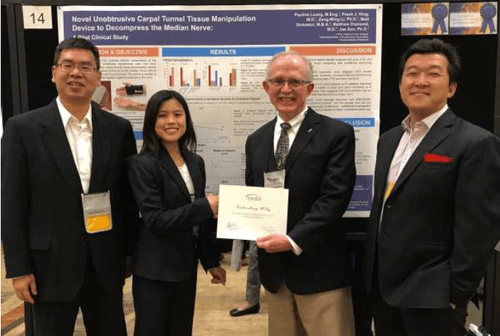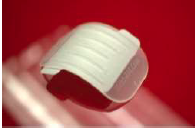Wrist-Aid, A New Device That Alleviates Carpal Tunnel Syndrome (CTS) Symptoms, Wins Two Prestigious Awards
Award Presentation by AANEM President (Photo from L to R: Zong-Ming Li, PhD of Cleveland Clinic, PaulineLuong, ME Lead Author, William S. Pease, MD President of AANEM, and Jae Son, PhD Inventor)
Los Angeles, CA (September 18, 2017) – Pressure Profile Systems (PPS) and the authors of the study which led to the creation of Wrist-Aid that alleviates carpel tunnel syndrome received both the President’s Research Initiative Award and the Technologists Member Recognition Award - unusual dual recognitions - at the 2017 Annual Meeting of the American Association of Neuromuscular & Electrodiagnostic Medicine (AANEM) in Phoenix, Arizona, September 13-16.
Because of this recognition, the abstract describing the study and Wrist-Aid will be published in the Muscle & Nerve Journal, a prestigious publication in the medical industry.
Carpel tunnel syndrome (CTS) is one of the most widely recognized occupational health conditions. In the US, it affects 3-6% of working adults. A quarter to half a million people undergo carpal tunnel release surgery each year.
Wrist-Aid is a simple unobtrusive device that sticks to the underside of the wrist. The device applies a negative pressure to the affected region, pulling up on the tissue under the mid portion of the device, thus reducing compression and irritation. The results of the pilot clinical study suggest the device relieves CTS symptoms without the trauma of surgery or impairment of hand use as with traditional splints.
“I invented Wrist-Aid after suffering from CTS and trying many other conservative treatments without success. After it relieved my symptoms, I felt compelled to bringing this noninvasive, low-cost solution to millions of adults that currently suffer from CTS," said Dr. Jae Son, PPS Founder & CEO.
Wrist-Aid was investigated in a pilot clinical study (ClinicalTrials.gov ID NCT02534493) involving 11 CTS patients. Participants wore Wrist-Aid for 8-10 hours daily for 4 weeks. The average raw improvement in Boston Carpal Tunnel Questionnaire (BCTQ) Symptom Severity Scale (SSS) at the 4-week time point is 0.59. (The SSS is a scale from 1 being no symptoms to 5 being the worst symptoms.) The average raw improvement in SSS at the 12-week time point is 0.72. Unilateral patients reported an average improvement in symptom severity of 0.9 points at 4 weeks and 1.2 points 8 weeks post-treatment. For comparison, other studies have found surgery produces a raw improvement in SSS of 0.8 to 1.5 three months after surgery.
“Our Hand Research Laboratory in partnership with PPS recently received a NIH SBIR Phase II grant to conduct further research and development on Wrist-Aid. PPS leads the development and commercialization while our laboratory carries out scientific studies to investigate the therapeutic mechanisms and further validate the efficacy of Wrist-Aid for CTS patients.” said Dr. Zong-Ming Li, Professor in Biomedical Engineering, Orthopaedic Surgery, and Physical Medicine and Rehabilitation at Cleveland Clinic.
For more information, visit PPS’s special product website at www.wrist-aid.com or contact Pauline Luong.
ABOUT PPS
Founded over 20 years ago as Pressure Profile Systems, Inc. to address tactile sensors for robotics at Harvard University, PPS has expanded to develop innovative solutions involving the sense of touch for fortune 500 companies as well as incubating useful sensor-based products.


